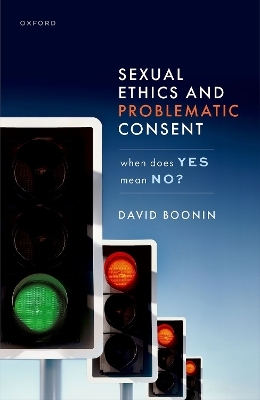
Sexual Ethics and Problematic Consent
When Does Yes Mean No?
Seiten
2024
Oxford University Press (Verlag)
978-0-19-286969-2 (ISBN)
Oxford University Press (Verlag)
978-0-19-286969-2 (ISBN)
- Noch nicht erschienen (ca. Dezember 2024)
- Versandkostenfrei innerhalb Deutschlands
- Auch auf Rechnung
- Verfügbarkeit in der Filiale vor Ort prüfen
- Artikel merken
Boonin discusses a variety of cases where someone says yes to having sex under conditions that make it unclear whether their saying yes should count as the kind of consent that makes it okay to have sex with them. These include problematic cases involving coercion, deception, incompetence, and manipulation.
When it comes to sex, no means no, but yes doesn't always mean yes. Cases where a person's yes to sex should be treated as a no are uncontroversial when they involve forms of coercion, deception, or incompetence that clearly render their consent to sex invalid. But between those cases where yes clearly means yes and those where yes clearly means no lie a variety of more problematic cases. In this provocative and challenging book, David Boonin considers what we should say about them.
Clear cases of coercion, for example, involve the threat of significant physical harm. But what should we say about cases involving the threat of harms that are relatively insignificant or that involve no physical harm at all? Impersonating someone's spouse to trick them into saying yes to sex is clearly very wrong, but what about the more mundane kinds of lies people tell when they're trying to meet someone? It's wrong to have sex with someone who says yes when they're so drunk they're about to pass out and not wrong if they say yes after having a few sips of beer. What, though, should we say about the more difficult cases in the middle where it's genuinely unclear whether they've had too much to drink? What's the most reasonable view about other forms of incompetent consent to sex, like those involving young children, elderly dementia patients, or people born with severe and permanent cognitive impairments? And what about cases of problematic sexual consent that don't involve coercion, deception, or incompetence at all? Can a patient give valid consent to sex with their therapist? Can the offer of a large amount of money in exchange for sex invalidate the sexual consent the offer elicits? Boonin offers a variety of clear and at times surprising answers to these and other questions about unclear cases in an engaging discussion that should be of interest to students and scholars as well as to anyone else who is concerned with problematic sexual consent.
When it comes to sex, no means no, but yes doesn't always mean yes. Cases where a person's yes to sex should be treated as a no are uncontroversial when they involve forms of coercion, deception, or incompetence that clearly render their consent to sex invalid. But between those cases where yes clearly means yes and those where yes clearly means no lie a variety of more problematic cases. In this provocative and challenging book, David Boonin considers what we should say about them.
Clear cases of coercion, for example, involve the threat of significant physical harm. But what should we say about cases involving the threat of harms that are relatively insignificant or that involve no physical harm at all? Impersonating someone's spouse to trick them into saying yes to sex is clearly very wrong, but what about the more mundane kinds of lies people tell when they're trying to meet someone? It's wrong to have sex with someone who says yes when they're so drunk they're about to pass out and not wrong if they say yes after having a few sips of beer. What, though, should we say about the more difficult cases in the middle where it's genuinely unclear whether they've had too much to drink? What's the most reasonable view about other forms of incompetent consent to sex, like those involving young children, elderly dementia patients, or people born with severe and permanent cognitive impairments? And what about cases of problematic sexual consent that don't involve coercion, deception, or incompetence at all? Can a patient give valid consent to sex with their therapist? Can the offer of a large amount of money in exchange for sex invalidate the sexual consent the offer elicits? Boonin offers a variety of clear and at times surprising answers to these and other questions about unclear cases in an engaging discussion that should be of interest to students and scholars as well as to anyone else who is concerned with problematic sexual consent.
David Boonin is Professor of Philosophy at the University of Colorado Boulder. He received his B.A. in philosophy and history summa cum laude from Yale University in 1986 and his Ph.D. in philosophy from the University of Pittsburgh in 1992. He taught at Georgetown University (1992-94) and Tulane University (1994-98) before taking up his current position at CU in 1998. He is the author of many titles including Beyond Roe (2019) and Dead Wrong (2019).
1: Introduction
2: Coercion and Sexual Consent
3: Deception and Sexual Consent
4: Incompetence and Sexual Consent
5: Manipulation and Sexual Consent
| Erscheint lt. Verlag | 12.12.2024 |
|---|---|
| Verlagsort | Oxford |
| Sprache | englisch |
| Maße | 156 x 234 mm |
| Themenwelt | Geisteswissenschaften ► Philosophie ► Ethik |
| Recht / Steuern ► Allgemeines / Lexika | |
| Recht / Steuern ► EU / Internationales Recht | |
| ISBN-10 | 0-19-286969-8 / 0192869698 |
| ISBN-13 | 978-0-19-286969-2 / 9780192869692 |
| Zustand | Neuware |
| Haben Sie eine Frage zum Produkt? |
Mehr entdecken
aus dem Bereich
aus dem Bereich
unsere kollektive Verantwortung
Buch | Hardcover (2023)
wbg Theiss in Wissenschaftliche Buchgesellschaft (WBG) (Verlag)
35,00 €


